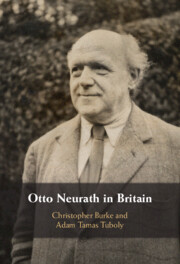Book contents
- Otto Neurath in Britain
- Otto Neurath in Britain
- Copyright page
- Contents
- Figures
- Acknowledgements
- Archival Sources and Abbreviations
- Introduction
- Chapter 1 Prelude
- Chapter 2 From Vienna to The Hague
- Chapter 3 Escape and Internment
- Chapter 4 Becoming ‘British Furniture’
- Chapter 5 Logical Empiricism in Britain
- Chapter 6 The Language Problem
- Chapter 7 Visual Education
- Chapter 8 On German Culture and Post-war Re-education
- Chapter 9 From Socialist to Democratic Planning in Context
- Chapter 10 ‘Sociologist of Happiness’
- Coda
- Bibliography
- Index
Chapter 9 - From Socialist to Democratic Planning in Context
Published online by Cambridge University Press: 09 January 2025
- Otto Neurath in Britain
- Otto Neurath in Britain
- Copyright page
- Contents
- Figures
- Acknowledgements
- Archival Sources and Abbreviations
- Introduction
- Chapter 1 Prelude
- Chapter 2 From Vienna to The Hague
- Chapter 3 Escape and Internment
- Chapter 4 Becoming ‘British Furniture’
- Chapter 5 Logical Empiricism in Britain
- Chapter 6 The Language Problem
- Chapter 7 Visual Education
- Chapter 8 On German Culture and Post-war Re-education
- Chapter 9 From Socialist to Democratic Planning in Context
- Chapter 10 ‘Sociologist of Happiness’
- Coda
- Bibliography
- Index
Summary
Since the early 1930s, a broad acceptance of the need for social planning had been growing in Britain. Neurath naturally became involved in debates on this matter, not only with British and American scholars (C. H. Waddington and James Burnham) but with fellow Central European émigrés in the UK, Karl Mannheim and Friedrich Hayek. Neurath and Mannheim concurred on the possibility of ‘planning for freedom’, whereas Hayek feared that any socialist planning would lead inevitably to totalitarianism. Neurath took issue with this, not least in his reading of Hayek’s The Road to Serfdom, which can be reconstructed from Neurath’s copious notes in his own copy. Neurath’s ideas of the 1920s for a socialized ‘economy in kind’ were moderated by his situation in Britain, with its democratic ‘muddle’ of the 1940s. By contextualizing Neurath’s views in relation to other prominent figures of the era, we point out what made him unique among them.
Keywords
- Type
- Chapter
- Information
- Otto Neurath in Britain , pp. 232 - 265Publisher: Cambridge University PressPrint publication year: 2025

